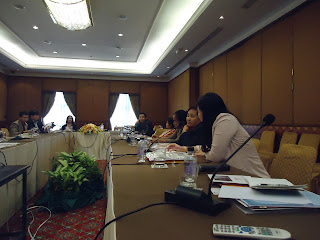"We are calling for a speedy resolution as there are 1100 jobs at the mine which are in jeopardy.Loss of these jobs would have adverse flow on effects to the local communities." : Kingsgate Executive Chairman Ross Smyth-Kirk.
I found this news is fascinating since this is the area where we conducted our field research in Thailand an we spent time with the community and the company. I hope they find the best solutions for this situation real soon.
Bangkok: Thai authorities have ordered the suspension for 30 days of an Australian gold mine in northern Thailand amid concerns over the health of thousands of villagers living nearby.
Random urine and blood tests showed above-standard arsenic and manganese levels in villagers near
Kingsgate Consolidated's Chatree gold mine 280 kilometres north of Bangkok, according to Porntip Rojanasunan, director-general of the Justice Ministry's Central Institute of Forensic Science.
An order from the institute says "we are of the opinion the mining might have affected the health of villagers."
It says the purpose of the suspension "is to determine whether the health hazards were caused by the company's operation."
Thai media reported mine managers have told its 1,100 employees and stopped operation.
The mine is operated by Akara Resources Public Company, a subsidiary of Sydney-based Kingsgate Consolidated.
In a statement, Kingsgate Executive Chairman Ross Smyth-Kirk said the company was stunned by the sanction. It has hired toxicology experts to carry out a study on the causes of any elevated test results.
"We are shocked and amazed at the temporary suspension order at the Chatree Mining Complex, situated in central Thailand which is internationally recognised as one of the safest gold mines in the world," Mr Smyth-Kirk said.
"It is important to note that arsenic and manganese are not used or stored at the Chatree Mining operation now or at any time in its history.
"We are calling for a speedy resolution as there are 1100 jobs at the mine which are in jeopardy.Loss of these jobs would have adverse flow on effects to the local communities."
Chatree is Thailand's first and largest gold mine that commenced operations in 2001, producing more than 1.3 million ounces of gold and more than 5.8 million ounces of silver as at June 2013.
Akara recorded revenues of $233 million and profit of $59 million in the fiscal year ended June 2013.
Kingsgate Consolidated claims on its website it has an "outstanding occupational and health record coupled with stringent environmental controls that help underpin the existing operations."
But the mine has faced complaints and law suits filed by communities and villager groups in the past, mainly related to claims about the environment and health.
In December the Central Institute of Forensic Science said that as many as 6,000 people living near the mine may have heavy metals in their blood, the Bangkok Post reported.
Tests found manganese and arsenic in 329 of 600 blood samples collected from local livings in Thap Khlo district near the mine, the institute said.
"The results are very worrying," Ms Porntip said at the time.
Akara Resources said in December the company had co-operated with the institute while carrying out its tests.
"We are pleased to meet with Khunying Porntip as we believe she will conduct proper testing," Akjara chief executive Pakorn Sukhum said before the tests were carried out.
Mr Pakorn maintained the company operates to the best international practices in health and environmental standards.
"The fact that Chatree continues to be allowed to operate shows that we adhere to required standards and regulations," he said at the time.
Akara Resources said in December that the most recent blood and urine tests it carried out in June 2014 for 800 Akara and sub-contractor workers showed arsenic and manganese levels within normal limits.
Source:
http://www.smh.com.au/business/mining-and-resources/thailand-shuts-down-australian-gold-mine-over-health-fears-20150114-12nrfd.html#ixzz3PXVd1GUh


















































